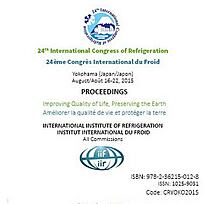
IIR document
Modelling and development of sustainable refrigerated road transport systems.
Number: pap. n. 324
Author(s) : FRANCIS C., DAVIES G., EVANS J., et al.
Summary
Refrigerated road transport (RRT) vehicles are large users of energy, and reportedly have relatively high leakage of hydrofluorocarbon refrigerant gases, both of which contribute to global warming. The experience obtained from widespread research in leak reduction in stationary refrigeration systems can be instructive in combatting leakage in RRT systems, which has received less focus to date. This paper will take an integrated approach to develop and describe a preliminary model for sustainable RRT systems. It will first review lessons learned about refrigerant leakage in stationary systems in an effort to identify problematic/leak prone components common to transport refrigeration systems. This will then be followed by a survey of recent studies conducted in modelling transport refrigeration systems to advance energy efficiency. Initial results from the model illustrate the need to improve the efficiency of the refrigeration system, together with preventative maintenance of the box structure and refrigeration system as a whole.
Available documents
Format PDF
Pages: 8 p.
Available
Public price
20 €
Member price*
Free
* Best rate depending on membership category (see the detailed benefits of individual and corporate memberships).
Details
- Original title: Modelling and development of sustainable refrigerated road transport systems.
- Record ID : 30016185
- Languages: English
- Source: Proceedings of the 24th IIR International Congress of Refrigeration: Yokohama, Japan, August 16-22, 2015.
- Publication date: 2015/08/16
- DOI: http://dx.doi.org/10.18462/iir.icr.2015.0324
Links
See other articles from the proceedings (657)
See the conference proceedings
Indexing
-
Refrigerant leakage in the refrigerated transpo...
- Author(s) : CAVALIER G., DEVIN E., MICHINEAU T., et al.
- Date : 2016/04/07
- Languages : English
- Source: 4th IIR International Conference on Sustainability and the Cold Chain. Proceedings: Auckland, New Zealand, April 7-9, 2016.
- Formats : PDF
View record
-
Analysis of leakage of refrigerants in refriger...
- Author(s) : DEVIN E., MICHINEAU T., FOURNAISON L., et al.
- Date : 2015/08/16
- Languages : English
- Source: Proceedings of the 24th IIR International Congress of Refrigeration: Yokohama, Japan, August 16-22, 2015.
- Formats : PDF
View record
-
Prediction of refrigerant leakage for discharge...
- Author(s) : MIN B. C., NOH K. Y., YANG J. S., et al.
- Date : 2014/07/14
- Languages : English
- Source: 2014 Purdue Conferences. 22nd International Compressor Engineering Conference at Purdue.
- Formats : PDF
View record
-
Implementation of R134a phase out.
- Author(s) : SCHULTE-BRAUCKS R.
- Date : 2006/02/17
- Languages : English
View record
-
Partial load test protocol for multi temperatur...
- Author(s) : POURCHERESSE L., CHAKIACHVILI B., TALHOUARN F., LEJEUNE M.
- Date : 2020/08/26
- Languages : English
- Source: 6th IIR International Conference on Sustainability and the Cold Chain. Proceedings: Nantes, France, August 26-28 2020
- Formats : PDF
View record
